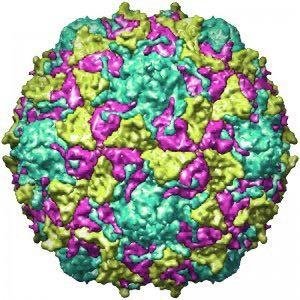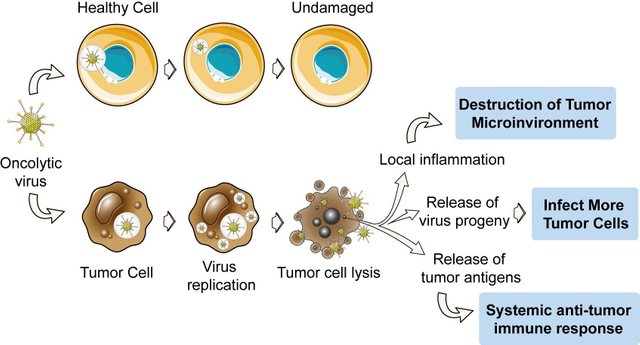Brain Cancer Treated with Recombinant Poliovirus

Glioblastoma is a violent brain cancer that currently has no effective treatment. The standard treatment is to attempt to surgically remove the tumor, yet the survival rate of this procedure is extremely low, and most surviving patients have a post-op lifespan of about 18 months.
One of the major obstacles in treating this type of cancer(and most types of cancer in general) is not having the ability to target the cancerous cells and to destroy them in a way that doesn’t damage healthy tissue.
An important fact about Tumor Cells is that they have a tendency to overly express certain membranal protein receptors, due to the aggressive nature of their environment(many cycles of cell division etc.).
An example for such a protein is the CD155 receptor, which is widely expressed in cells of solid tumors and in major components of the tumor microenvironment, which is recognized by the Poliovirus, or in this case a recombinant nonpathogenic polio–rhinovirus chimera (PVSRIPO).
The reason for a need of a genetically modified virus is to prevent it from being able to infect healthy brain cells.
The way by which the researchers achieved this goal was by using a poliovirus similar to the one used in vaccines(Sabin 1) where the internal ribosome entry site (IRES) on the poliovirus was replaced with a parallel segment from the HRV2(human rhinovirus, cause of common cold) and thus avoiding neurovirulence and preventing healthy brain cells from being damaged.

Once administered the virus will enter the tumor cells and rapidly replicate within them, subsequently causing them to be destroyed.
The latest research, published this July in the New England Journal of Medicine, reports a clinical test done on 60 terminally ill patients over a period of five years in which this treatment resulted in the prolonging of the patients lives to up to 24 and even 36 months!
Hello @badnimits, I would like to share some advises with you so you can continue to improve in your coming articles:
Cheers!
This is a good summary of 20 years of research. The trial results indeed looks promising. I like that even though the virus was not able to kill all cancer cells it also was taken up by antigen presenting cells generating an immune response against virus infected cancer cells. Thanks for sharing this valuable update. I hope the next phase goes pretty smoothly as well.
Thank you for reading! I enjoy reading your posts as well. I am sure you are aware that many times these researches carry a lot of promise with them yet when it comes to the money time they disappoint. Sometimes they are rehashing old information just to show their university that there is some progress. However, I do believe that in the following years many different disciplines will finally come together to present us with amazing medical and biochemical solutions.